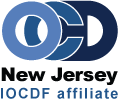2015 Annual Conference Review
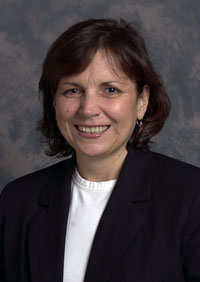 On Sunday March 15, 2015, Anne Marie Albano, Ph.D. presented at the annual conference of OCD New Jersey (OCD NJ). Dr. Albano is Associate Professor of Clinical Psychology in Psychiatry at Columbia University and Director of the Columbia University Clinic for Anxiety and Related Disorders. Dr. Albano is a Fellow of the American Psychological Association, Founding Fellow of the Academy of Cognitive Therapy, a Beck Institute Scholar, and is Board Certified in Clinical Child and Adolescent Psychology. Dr. Albano is Past President of the Society for Clinical Child and Adolescent Psychology of the American Psychological Association and also past- president of the Association for Behavioral and Cognitive Therapies. She has published more than 90 percents and chapters and is the co-author of several cognitive behavioral treatment manuals. Her book with Leslie Pepper, Helping Your Anxious Child: Free Your Child from Fears and Worries and Create a Joyful Family Life, was the 2014 Self- Help Book Award winner from the American Society of Journalists and Authors.
On Sunday March 15, 2015, Anne Marie Albano, Ph.D. presented at the annual conference of OCD New Jersey (OCD NJ). Dr. Albano is Associate Professor of Clinical Psychology in Psychiatry at Columbia University and Director of the Columbia University Clinic for Anxiety and Related Disorders. Dr. Albano is a Fellow of the American Psychological Association, Founding Fellow of the Academy of Cognitive Therapy, a Beck Institute Scholar, and is Board Certified in Clinical Child and Adolescent Psychology. Dr. Albano is Past President of the Society for Clinical Child and Adolescent Psychology of the American Psychological Association and also past- president of the Association for Behavioral and Cognitive Therapies. She has published more than 90 percents and chapters and is the co-author of several cognitive behavioral treatment manuals. Her book with Leslie Pepper, Helping Your Anxious Child: Free Your Child from Fears and Worries and Create a Joyful Family Life, was the 2014 Self- Help Book Award winner from the American Society of Journalists and Authors.
Dr. Albano began her talk with comments on development including anxiety is normal and expected, temperament (i.e., infant personality) sets the stage, and tasks of development vary with age. She explained that anxiety increases through adolescence, which she considers the period between eighth grade and the end of high school, because of social, academic and psychological factors. “Expected” developmental milestones for the end of adolescents are: 1) emotional independence from parents, 2) develop self identity, 3) behavioral independence from parents, 4) manage money responsibly, 5) make and keep long term relationships, and 6) take control of personal self care.
Dr. Albano emphasized the importance of understanding development, and discussed the shift in transition to “full” adulthood. Researchers observed changes in culture and identified a developmental stage called “emerging adulthood (EA).” In the 1950s, adolescents tended to graduated high school and entered adulthood with career/ marriage. In the 2000s, adolescents tended to graduated high and entered EA, then career, and then marriage. “Expected” developmental milestones for the end of EA (i.e., late 20s) are: 1) accept sexual identity, 2) form long term romantic relationships, 3) formulate long term vocational goals, 4) complete educational requirements, 5) establish financial independence, and 6) live independently.
The significance of OCD/ anxiety and adolescent/ EA development includes: 1) the child gets taken off the developmental trajectory at the point of OCD/ anxiety symptoms, 2) increasing disability leads to falling further behind same-aged peers in meeting developmental tasks, and 3) a critical need to address development as well as symptom disability. Dr. Albano then focused the talk on treatment and study outcomes; for instance, the POTS Acute Outcomes study found combined treatment (medication + cognitive behavioral treatment (CBT) did the best, followed by CBT alone, then medication alone, and last placebo.Adolescents and EAs with OCD and anxiety can experience “failure to launch,” general overall disability, educational problems, work/ career problems, peer relationships suffer, family conflict, and/or lack of overall independent functioning. The developmental model explains: 1) anxiety problems in adolescents and EAs continue to be partly maintained by parental overprotection (POP), 2) anxiety is maintained through avoidance, escape and withdrawal, and 3) interaction of POP and anxiety results in stalled developmental tasks.
Dr. Albano explained the Launching Emerging Adolescents and Adults Program (LEAP), which is a model for developmental CBT for adolescents and EAs with OCD and anxiety. In order for adolescents and EAs to “launch,” they need problem solving skills, social skills, emotion regulation skills, realistic thinking, perspective, stress/ time management skills, opportunities to “learn and mess up,” and “family support but not overprotection!”The family intervention in LEAP aims to 1) reduce level of conflict and feelings of anger and blame, 2) enhance family problem solving, 3) facilitate disengagement from child’s OCD symptoms, 4) rebuild “OCD free” family interaction patterns, and foster an environment to maintain treatment gains. Dr. Albano detailed the sessions involved in the LEAP model, which includes psychoeducation, exposure and response prevention, cognitive restructuring, mindfulness and much more. LEAP outcome targets include the reduction of anxiety and increase of transition tasks, such as the EAs assuming full responsibility for treatment, effective problem solving, healthy reliance on parents, and increase in proactive behavior. Dr. Albano engaged the audience throughout the presentation with lively questions and answers, and mastery of the material she was discussing.The conference continued with an emotional highlight: the Living with OCD panel moderated by Dr. Weg. The panel consisted of a 15 year old female who remembers her OCD symptoms started as early as 4 years old with checking the oven and washing her hands 30 times a day. She feels she’s in a “better place now” because of CBT and medication. A 17 year old female who reported having severe OCD and anxiety. She remembers wanting to be in control, but found herself “a prisoner to OCD with no control.” She traded her “loyalty to OCD” and its demanding cycle to “fight for my life in a residential treatment center” two years ago, and feels she is doing much better. A 24 year old male who needed to do counting rituals when he was talking and reading. He was also diagnosed with Tourette’s, depression, and ADHD, but said he has not had OCD symptoms in 5 years. A middle aged female who took part in checking rituals as a child, but did not have a name for OCD then. She remembers “OCD’s ugly head” coming out after she was married with contamination obsessions and washing compulsions. She emphasized ERP therapy as the “golden key” and that “anticipatory anxiety is way worse than the exposure itself.”
Each shared their valiant experiences living with OCD, and then audience members asked the panel questions about various topics. As in previous years, the panel members encouraged, educated, and offered hopefulness to the individuals with OCD, their loved ones, and the professionals that treat them.
DVDs of the annual conference presenter and Living with OCD panel are available for purchase by emailing ocdnjmail@gmail.com. All DVD titles from previous meetings are available on our website, www.ocdnj.org.
Dr. Rachel Strohl is a licensed psychologist at Stress and Anxiety Services of NJ in East Brunswick. She is on the Board of Directors at OCD New Jersey. She may be reached at 732-390-6694.
Photo Montage from the Conference
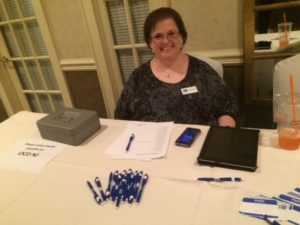
Board Member Nicole Torella
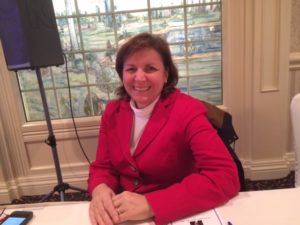
Dr. Anne Marie Albano
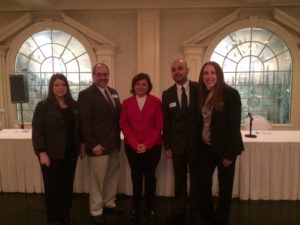
Dr. Deibler, Dr. Weg, Dr. Albano, Dr. Zambrano, Dr. Strohl
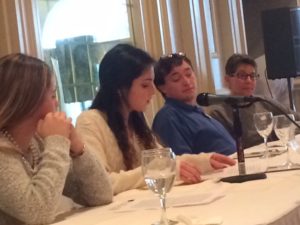
Living with OCD Panel
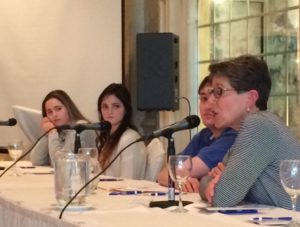
Samantha Sorid, Jen Meiskin, Sean Maron, Janet DePaulo
A Speech from Panelist Jennifer Meiskin
At our 15th annual conference on March 15, we had our “Living with OCD” Panel, as we have had every year since we started our organization. Over the years, these panels have consistently had an intense emotional effect on our conference attendees, which always perfectly compliments the intellectual stimulation afforded to us by our keynote speakers, who have been the country’s leaders in the study and treatments of OCD. This year was no different. While all four of our panel members this year were amazing, we asked one of them if we could publish her panel presentation in our newsletter for all to see. She agreed, and here it is. We encourage all of you to purchase the DVD of this year’s conference, by contacting our OCDNJ treasurer/videographer, Dr. Robert Zambrano at ocdnjmail@gmail.com – Allen H. Weg, EdD
Hello, I am Jennifer Meiskin. Today is actually my birthday so in about an hour or so I will be 17 and I am currently a junior at Robbinsville High School in New Jersey.
There are certain times in my life, now looking back on, that foreshadowed what my future self would undergo but at that time I had no idea, like when I hysterically cried in kindergarten having to give a boy who picked his nose and fit my criteria of “contaminated” my crayon. But, I can’t pinpoint an exact time or memory that would clearly dictate as to when or where my battle with OCD started to boil, but before I knew it I was the kettle pot uncontrollably whistling, shaking, and overflowing.
There are many factors that played a role in the development of my extreme OCD and anxiety, for one, my years in kindergarten up to third grade or so, I first hand witnessed my oldest sister go through the relentless ties anorexia had on her. Being so young and feeling so helplessly out of control, my brain grasped for whatever it could get its hands on to be in power of, which now I can tell you is a huge contradiction because OCD is all about wanting and convincing ourselves we have all of this control, but in fact we are control-less and a prisoner to our OCD.
But, nothing became too alarming until my middle school years. 4th and 5th grade were the ride up on the roller coaster, and after that I was full blown into my imprisonment. My main obsessions and compulsions revolved around that of contamination, but I dabbled in almost, if not all of the different ‘types’ of OCD such as scrupulosity and hoarding.
I had lost complete sight of who I was in the affinity of my OCD. How I was able to even go to school, I cannot explain, my everyday functioning was being fully impaired. I was the laughing stock and the subject of teasing, I was embarrassed but the relationship and security I thought my OCD provided me with outweighed all of that. I constantly and vigorously picked my skin and fingers due to the severe anxiety, but the open wounds and cuts now scars, didn’t stop me from using hand sanitizer for which I now can see as irrational reasons. I remember vividly one time coming home from the food store and trying to show off my mom so I could put away all the groceries but first sanitize them all.
I was jeopardizing all of my relationships with my family members but that did not stop my loyalty towards my OCD; there were times I blatantly screamed in their faces and hysterically cried, but I couldn’t verbalize the ruthless, never-ending demanding cycle going on in my head. It was things like my mom making the slightest movement of my clean t-shirt touching something that I considered contaminated caused all hell to break loose.
At one point, I completely avoided my dad and all contact with him, I restrained from hugging him for months, and I felt so torn and trapped because I am a huge daddy’s girl, and I saw the pain and despair in his eyes, but that still wasn’t enough to break my loyalty towards OCD. I could go on and on about specific episodes and the war my brain was constantly fighting between OCD and Jenn, but if its one thing I want people to take away who are in this exhaustive battle is that OCD doesn’t have to be your life forever.
I use to fear, for this was what my life was going to be. I questioned the practicality of my future and how I’d be able to go off to college, get married, drive a car, all the things we’re entitled to while growing up when I had all these gruesome and burdening physical and mental handicapping rituals. I dreaded waking up day in and day out, every day because I knew it would just be another day of daunting obstacles I’d have to endure.
I will be the first to admit I am one stubborn person and I’m sure my parent would gladly vouch for that. And I can’t tell you when it clicked, when I decided that I wanted to fight for my life and right to live a life worth living, maybe once I realized I had been resided at rock bottom for too long, but it was the best decision I’ve ever made. I finally put my stubbornness, persistency, and the will to keep pushing through to use when my parents and I decided the only hope left was a residential treatment center.
The four months I lived there facing head on my worst nightmares everyday, were the most challenging, difficult, liberating, exhilarating and rewarding four months of my life, and that is an understatement. I remember how badly I yearned to one day be able to say “I made it,” and that I am a success story, and that life is so beautiful and magnificent on the other side of the spectrum, and for the past two years after my discharge from the residential treatment center, I can humbly and truthfully say all of those things. There is so much more to life that OCD blinds you from. You’ve got to want it though and fight for it, fists up is what my dad would say.
I’d be lying if I said I didn’t encounter struggles in my recovery today, but I stay honest to myself and have been taught impeccable skills and techniques to help me when I slip and/or prevent me from slipping. And here I am, about to be 17, and drive my own car, something I only envisioned in my wildest of dreams; I am no longer the screaming, shaking, kettle pot boiling over, but merely the blossoming kettle pot that is ready to pour a nice cup of tea and take on life.
